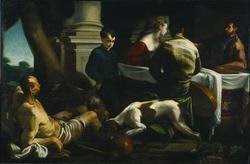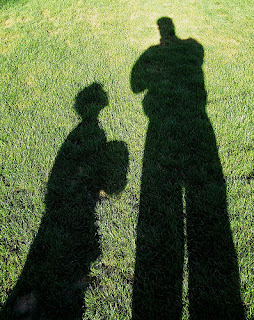COULD IT BE?
 26th Sunday in Ordinary Time
26th Sunday in Ordinary TimeLk 16:19-31
The philosopher Aristotle believed that all created realities move toward their respective telos. Telos is the fulfillment of every created reality. For example, we are human beings; thus, our telos is to be humane. Until we have not achieved our telos, we are not really happy.
One of Aristotles’ admirer was St. Thomas Aquinas, a Dominican friar renowned for his outstanding holiness and wisdom in philosophy and theology. St. Thomas used Aristotles’ philosophy ang gave it a Christian bent. What Aristotle called telos, St. Thomas named summum bonum. Summum bonum literally means “highest good” According to St. Thomas, our summum bonum is the beatific vision. Beatific vision is seeing the Almighty face-to-face, look at God forever. This is our highest good, the perfection of our joy.
Both Aristotle and St. Thomas Aquinas agree that, in this life, we cannot fully achieve our telos or summum bonum. We may have a foretaste of our telos or summum bonum but its fullness remains illusive in this life. Nonetheless, achieving our telos or summum bonum largely depends on the quality of our earthly life. Living according to our nature is a step closer to our telos or summum bonum while living contrary to our nature is a step away. In short, the more we are good the closer we are to our telos or summum bonum while the more we are bad the farther we are from our telos or summum bonum.
Aristotle and St. Thomas Aquinas, however, differ in identifying exactly where we achieve our telos or summum bonum. For Aristotle, our telos is found in what Plato, another famous philosopher and mentor of Aristotle, called “World of Forms”. “World of Forms” is a where an original and perfect form of whatever exists on earth is found. Instead of talking about a “World of Forms”, St. Thomas spoke about heaven. In heaven, we achieve and experience our summum bonum. And heaven is not so much a place as it is the state of being after life on earth. That state is the experience of seeing and living with God for ever; in short, beatific vision.
What significance does my daring philosophical exposition has on our reflection on this Sunday’s gospel? Nothing. Except three.
First, the desire to be happy is inherent in us.
Second, belief in the after life is inherent is us.
Third, the awareness that our earthly life is significantly related to and has an effect on our after life is inherent in us.
First, both the rich man and Lazarus in the parable today want happiness. But they have different views on happiness. For the rich man, happiness is wealth, expensive clothes, and lavish meal. For Lazarus, in the height of poverty, happiness is being able to pick up food from the long procession of various dishes from the rich man’s gate to the rich man’s table. As it is with the experience of the countless poor people until today, poverty teaches the poor to make their joys simple and their contentment easy to achieve. The poor is already happy to survive a day with just one meal – if ever there is a meal – but the rich whose table overflow with food is never satisfied. A makeshift house is already a palace for the urban poor but the condominium unit of the rich is empty.
Second, both Lazarus and the rich man know Abraham. They believe in the afterlife, and when they finally are in it, the truth surprises them. The exchange fate: the rich suffers in sheol, the world of the dead, while Lazarus rejoices in the company of the blessed. Similar to what we continue to observe today, belief in the afterlife is never a guarantee that the believer orients his or her values in life according to that belief. There are even those who live by the twisted philosophy: “Let us eat, drink, and get drunk! For tomorrow we die.”
Third, the earthly life of the two main characters in the parable today has a direct effect on the reversal of their fate in the afterlife. But the rich suffers and the poor finally rejoices not because God blesses poverty in itself. Rather, God blesses those who, in their poverty, place their ultimate hope in Him. Therefore, it is not merely a matter of poverty or affluence. The crux of the matter is in answering the question as regards what or who we really trust in life: our wealth or our God.
It is intriguing to know that the rich man in the parable is not a wicked man at all. The gospel is silent about his moral state. Likewise, nothing is mentioned if he does something evil against Lazarus. On the contrary, he even allows Lazarus to linger by the entrance of his mansion and to gather what falls from his seemingly bottomless banquet. The rich man does not seem guilty. But is precisely why he is culpable. The rich man does nothing evil against Lazarus but he likewise does nothing good for him. He simply let Lazarus be. He let him gather food. He let him linger by his gate. He let Lazarus remain poor. You may wonder if the rich man truly sees Lazarus at all.
The final point is quite heavy to bear. It can also be very disturbing for us. in the magnitude of the problems concerning poverty in the world or even, at least, in our local community, what can we really do to alleviate the plight of the poor? But the such a question is misleading, if not grossly wrong, because the question should really be: In the midst of the poverty of our fellow human being, what are we really doing?
We cannot conclude without noting that in the parable of Jesus, the poor is named while the rich man is nameless. Indeed, it is wrong to say that God is impartial. God is always partial to the poor. In the gospel today, He names, recognizes, and calls the poor “Lazarus”. But the rich man is never named and has always been so even to this day. Could it be because that rich man’s name should really be our name? Could it be? Just asking.

.jpg)

